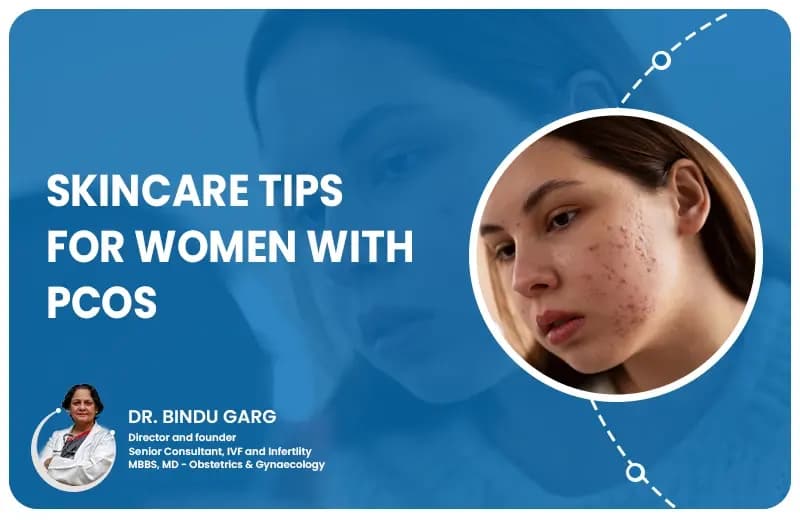
Skincare Tips for Women with PCOS
Polycystic ovary syndrome (PCOS) affects a large number of women across the world, especially in India. One of the most common and challenging problems faced by women with PCOS is related to their skin and hair. Acne, unwanted hair growth and other skin problems can affect self-esteem and confidence.
If you are struggling with these issues, then this blog is just for you. We will provide simple, easy-to-follow skincare tips that can help you manage acne and excessive hair growth, both of which are common symptoms of PCOS.
Whether you're looking for tips on how to treat acne, control excess hair growth, or maintain healthy skin despite the challenges of PCOS, you'll find all the information you need here.
Let’s look at skin care tips that will help you take control of your skin and hair health while managing PCOS.
Understand PCOS and Its Impact on Skin and Hair
PCOS is a hormonal disorder that can affect a woman's ovaries, menstrual cycle, fertility and physique. PCOS has the most severe effects on the skin and hair. The hormonal imbalance in PCOS often leads to the overproduction of androgens (male hormones), which can result in many skin and hair problems such as acne, excessive hair growth (hirsutism) and thinning of hair.
Related:- Polycystic Ovary Syndrome (PCOS)
How PCOS Causes Acne
Excessive production of androgens leads to increased oil production in the skin. As a result, pores become clogged and acne occurs. Acne in PCOS often appears on the lower part of the face, including the chin, jaw and neck.
How PCOS Causes Hair Growth
Women with PCOS may also experience excessive hair growth in areas typically associated with male hair growth, such as the upper lip, chin, chest, and back. This condition, known as hirsutism, is caused by high levels of androgens in the body.
Skincare Tips for Managing Acne in PCOS
Controlling acne when you have PCOS can be challenging, but it is not impossible. Here are some effective skincare tips to help control and prevent acne:
1. Maintain a Regular Skincare Routine
A regular skincare routine is essential to control acne. Use a gentle cleanser twice a day to remove dirt, oil, and impurities. Choose a sulfate-free, non-comedogenic cleanser that won't irritate your skin or clog pores.
2. Use Products with Salicylic Acid
Salicylic acid is a great ingredient for treating acne because it helps exfoliate the skin and clear clogged pores. It also has anti-inflammatory properties that reduce the redness and swelling associated with acne. Look for a cleanser, toner, or spot treatment that contains salicylic acid.
3. Don’t Skip Moisturizing
Even if your skin is oily due to PCOS, don't forget to apply moisturizer. Use a light, oil-free moisturizer to retain skin moisture without clogging the pores. Hydrated skin is less likely to overproduce oil.
4. Consider Topical Retinoids
Retinoids are effective in treating acne and preventing new breakouts. These vitamin A derivatives help increase skin cell turnover, prevent clogged pores, and reduce inflammation. Consult your dermatologist before using any retinoid product, as they can be potent and cause irritation if not used properly.
5. Use Sunscreen Daily
Acne treatments, especially those containing retinoids or salicylic acid, can make your skin more sensitive to the sun. Always apply sunscreen with at least SPF 30 before going outside to prevent sun damage and dark spots caused by acne.
Managing Excess Hair Growth (Hirsutism) with Skincare Tips
Excessive hair growth or hirsutism is another common problem for women with PCOS. Here are some tips to effectively manage unwanted hair growth:
1. Laser Hair Removal
Laser hair removal is a long-term solution to reducing unwanted hair. It targets hair follicles, preventing them from growing back. Although laser hair removal can be expensive, it may provide a more permanent solution for women with PCOS who struggle with hirsutism.
2. Use Hair Removal Creams
Hair removal creams can be a temporary but effective solution to control excess hair. For sensitive skin, choose formulas that are designed for facial hair. Always do a patch test before applying the cream to avoid irritation.
3. Shaving or Waxing
Shaving or waxing can provide immediate results. These methods are inexpensive and easy to do at home. However, they can cause irritation or ingrown hairs, so be sure to follow proper technique and care to minimize side effects.
4. Consider Anti-Androgen Medications
For women with severe hair loss, doctors may recommend anti-androgen medications such as spironolactone. These medications can help reduce androgen production in the body and reduce excessive hair growth. Always consult a doctor before starting any medication.
Related:- Difference Between PCOS vs Ovarian Cysts
Skincare Tips for Women with PCOS: General Tips for Healthy Skin
Maintaining healthy skin while managing PCOS requires a holistic approach. Here are some general skincare tips that will help improve your skin health:
- Stay Hydrated: Drinking plenty of water is important to keep your skin hydrated. Dehydrated skin is more prone to acne and irritation. Aim to drink at least 8 glasses of water a day to keep your skin moisturized and healthy.
- Eat a Balanced Diet: What you eat plays a key role in your skin health. Include foods rich in antioxidants, vitamins A, C and E, and healthy fats to maintain your skin health. Avoid excessive consumption of sugar and processed foods, as they can contribute to acne flare-ups.
- Manage Stress: Stress can worsen acne and other skin problems. Incorporating stress management techniques such as yoga, meditation or deep breathing exercises can help reduce the effects of stress on your skin.
- Regular Exercise: Exercise helps improve blood circulation, which can benefit your skin by providing it with more oxygen and nutrients. Regular physical activity can also help regulate hormones, which may reduce acne and other skin problems related to PCOS.
People Also Ask (FAQs)
Q1: Can PCOS cause acne in women?
Yes, PCOS can cause acne due to hormonal imbalances, particularly due to excess production of androgens (male hormones), which increases oil production in the skin, leading to clogged pores and acne.
Q2: How can I manage excess hair growth caused by PCOS?
Laser hair removal, shaving, waxing, or hair removal creams can be used to control excess hair growth caused by PCOS. Medications such as spironolactone may also help reduce hair growth.
Q3: Are there any skincare products specifically designed for PCOS-related acne?
Yes, look for skincare products that contain ingredients like salicylic acid, benzoyl peroxide, or retinoids, which are effective in treating acne and controlling oil production. Always consult your dermatologist before trying new products.
Q4: How can I prevent acne scars from PCOS?
To prevent acne scars, use products with ingredients like vitamin C and niacinamide that help lighten dark spots. Avoid picking at pimples to reduce scarring.
Conclusion: Taking Control of Your Skin Health with PCOS
It can be challenging to control acne and excess hair growth due to PCOS, but with the right skincare routine and lifestyle changes, you can improve your skin health. Incorporating products like salicylic acid for acne, considering laser hair removal for hirsutism, and following general skin care tips can make a significant difference. Always consult a dermatologist or healthcare professional before starting any new treatment.
By understanding the connection between PCOS and your skin and taking proactive steps, you can feel more confident and comfortable in your skin. Keep in mind that consistency is key, and patience is essential when managing PCOS-related skin issues.
Content Created By:

CyberBizz Technologies
Team - Content Curator